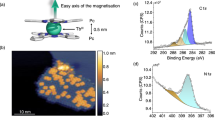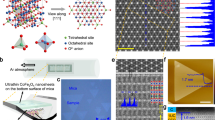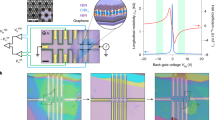Abstract
MAGNETIC storage of information requires the ability to manipulate the magnetization of thin films with high sensitivity and spatial resolution. Non-magnetic overlayers are known to affect the characteristics of magnetic films: for example, the direction of magnetization of cobalt and iron films can be altered by deposition of a monolayer of copper and gold, respectively1–3. The magnetic properties of cobalt films seem to be particularly sensitive to copper overlayers—deposition of only sub-monolayer amounts of copper will decrease the coercive field required to invert the magnetization direction4. Here we show that copper coverages as small as three-hundredths of a monolayer are sufficient to rotate by 90° the magnetization of Co films up to 20 atomic layers thick. This implies that the spins of about 500 cobalt atoms switch direction for each copper atom added. Adding more copper eventually switches the magnetization back to its original direction. This fine tuning of thin-film magnetism might be useful for developing sensitive magnetic-field sensors, as well as for magnetic recording.
This is a preview of subscription content, access via your institution
Access options
Subscribe to this journal
Receive 51 print issues and online access
$199.00 per year
only $3.90 per issue
Buy this article
- Purchase on Springer Link
- Instant access to full article PDF
Prices may be subject to local taxes which are calculated during checkout
Similar content being viewed by others
References
Ould-Mahfoud, S. et al. Mater. Res. Soc. Symp. Proc. 313, 251–256 (1993).
Engel, B. N., Wiedmann, M. H., Van Leeuwen, R. A. & Falco, C. M., Phys. Rev. B48, 9894–9897 (1993).
Elmers, H. J. & Gradmann, U. Surf. Sci. 304, 201–207 (1994).
Schumann, F. O., Buckley, M. E. & Bland, J. A. C., J. appl. Phys. 76, 6094–6095 (1994).
Allenspach, R. Physics World, 7, 44–49 (1994).
Bader, S. D. J. Magn. magn. Mater. 100, 440–454 (1991).
Krams, P., Hillebrands, B., Guentherodt, G. & Oepen, H. P. Phys. Rev. B49, 3633–3636 (1994).
Li, C., Freeman, A. J., Jansen, H. J. F. & Fu, C. L. Phys. Rev. B42, 5433–5442 (1990).
Tsang, C. et al. IEEE Trans. Mag. 30, 3801–3806 (1994).
Eigler, D. M. & Schweizer, E. K. Nature 344, 524–526 (1990).
Crommie, M. F., Lutz, C. P. & Eigler, D. M. Science 262, 218–220 (1993).
Grolier, V., Ferré, J., Maziewski, A., Stefanowicz, E. & Renard, D. J. appl. Phys. 73, 5939–5941 (1993).
Oepen, H. P., Benning, M., Ibach, H., Schneider, C. M. & Kirschner, J. J. Magn. magn. Mater. 86, L137–L142 (1990).
Author information
Authors and Affiliations
Rights and permissions
About this article
Cite this article
Weber, W., Back, C., Bischof, A. et al. Magnetic switching in cobalt films by adsorption of copper. Nature 374, 788–790 (1995). https://doi.org/10.1038/374788a0
Received:
Accepted:
Issue Date:
DOI: https://doi.org/10.1038/374788a0
This article is cited by
-
Remanence properties and Mössbauer analysis of the strontium hexaferrite with copper deposited by sputtering
Journal of Materials Science (2024)
-
Induced perpendicular magnetization in a Cu layer inserted between Co and Pt layers revealed by x-ray magnetic circular dichroism
Scientific Reports (2017)
-
The remarkable difference between surface and step atoms in the magnetic anisotropy of two-dimensional nanostructures
Nature Materials (2003)
-
Edge atoms do all the work
Nature Materials (2003)
-
Quantum oscillations in a confined electron gas
Nature (1997)
Comments
By submitting a comment you agree to abide by our Terms and Community Guidelines. If you find something abusive or that does not comply with our terms or guidelines please flag it as inappropriate.



